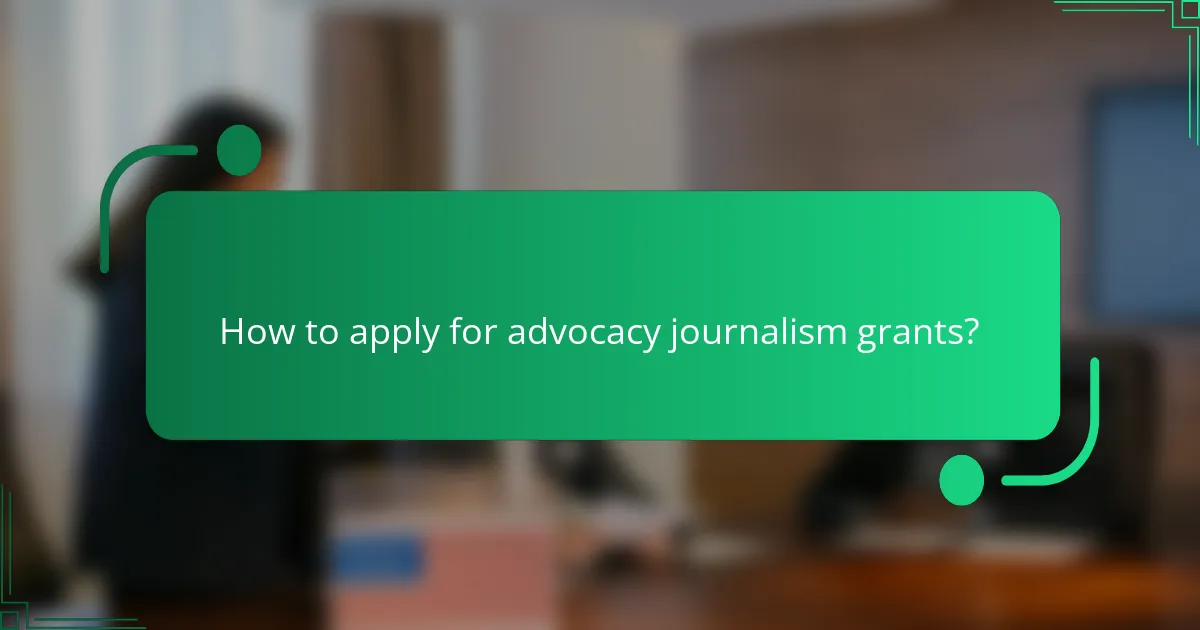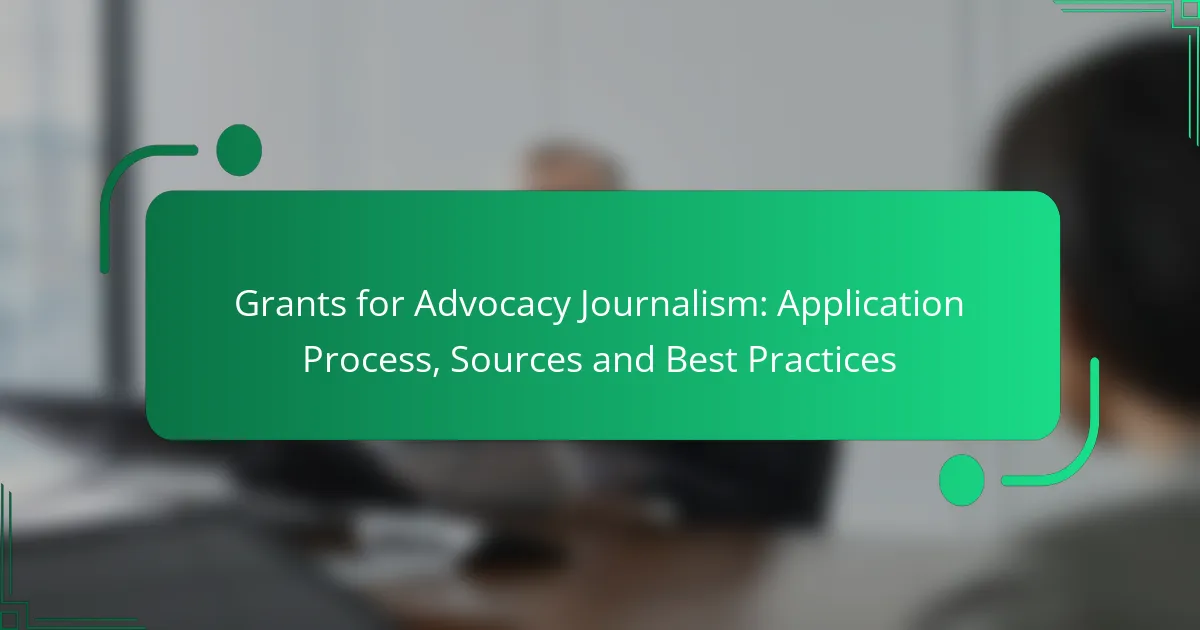Grants for advocacy journalism play a crucial role in funding investigative reporting and social justice initiatives across the United States. By focusing on key issues such as human rights and environmental justice, these grants empower journalists to create impactful narratives that promote change. Understanding the application process, including eligibility criteria and necessary documentation, is essential for securing funding and enhancing the effectiveness of your journalistic endeavors.

What are the best grants for advocacy journalism in the United States?
The best grants for advocacy journalism in the United States provide essential funding to support investigative reporting and social justice initiatives. These grants often focus on issues such as human rights, environmental justice, and government accountability, enabling journalists to produce impactful stories that drive change.
Open Society Foundations Grants
The Open Society Foundations offer various grants aimed at promoting transparency, accountability, and human rights through journalism. These grants typically support projects that investigate corruption or advocate for marginalized communities.
Applications are accepted on a rolling basis, and funding can range from a few thousand to several hundred thousand dollars, depending on the project’s scope. It’s crucial to align your proposal with the foundation’s mission and demonstrate a clear impact.
Fund for Investigative Journalism
The Fund for Investigative Journalism provides grants specifically for investigative reporting projects that expose wrongdoing and promote accountability. This fund is particularly supportive of freelance journalists and smaller media outlets.
Grants usually range from $5,000 to $10,000, and applicants must submit a detailed proposal outlining their story idea, methodology, and potential impact. Successful projects often highlight underreported issues and engage the community.
McCormick Foundation Grants
The McCormick Foundation offers grants to support journalism that fosters informed and engaged communities. Their focus includes projects that enhance public understanding of critical issues and encourage civic participation.
Grant amounts vary widely, and applicants should emphasize how their work will contribute to community dialogue and awareness. It’s beneficial to include partnerships with local organizations to strengthen your proposal.
Google News Initiative Grants
The Google News Initiative provides funding for projects that innovate in journalism and enhance the news ecosystem. This initiative supports various types of projects, including those that leverage technology to improve reporting.
Grants can range from $50,000 to $1 million, depending on the project’s scale and potential impact. Applicants should focus on how their project will address a specific challenge in journalism and utilize technology effectively.
National Press Foundation Grants
The National Press Foundation offers grants and fellowships to support journalists in their pursuit of excellence and accountability in reporting. Their programs often focus on training and resources for journalists covering important social issues.
Funding amounts and opportunities vary, so it’s essential to stay updated on their offerings. Applicants should demonstrate a commitment to high-quality journalism and a clear plan for how the grant will enhance their reporting capabilities.

How to apply for advocacy journalism grants?
Applying for advocacy journalism grants involves understanding eligibility requirements, crafting a strong proposal, and submitting all necessary documentation on time. A well-prepared application can significantly enhance your chances of securing funding for your journalistic efforts.
Research grant eligibility criteria
Before applying for any advocacy journalism grant, it’s crucial to thoroughly research the eligibility criteria set by each funding organization. Criteria may vary widely, including factors such as the type of journalism, geographic focus, and the applicant’s background.
Many grants prioritize projects that address specific social issues or serve underrepresented communities. Make sure to align your project with the funder’s mission to enhance your chances of approval.
Prepare a compelling proposal
Your proposal should clearly articulate the goals, significance, and impact of your journalism project. Start with a strong executive summary that captures the essence of your work and its relevance to advocacy.
Include detailed descriptions of your methodology, target audience, and how the project will be executed. Use persuasive language and concrete examples to demonstrate the potential impact of your work.
Gather supporting documentation
Supporting documentation is essential to validate your proposal. This may include your resume, previous work samples, letters of support, and a budget outline detailing how funds will be allocated.
Ensure that all documents are well-organized and clearly labeled. This not only helps reviewers understand your project better but also reflects professionalism and attention to detail.
Submit application before deadlines
Timely submission of your application is critical. Be aware of all deadlines and plan your application process accordingly to avoid last-minute issues. It’s advisable to submit your application at least a few days before the actual deadline.
Double-check all components of your application for completeness and accuracy. Missing information can lead to disqualification, so a thorough review is essential before submission.

What are the common requirements for advocacy journalism grants?
Common requirements for advocacy journalism grants typically include a clear project description, a detailed budget, an impact measurement plan, and samples of previous work. These elements help funders assess the viability and potential effectiveness of the proposed journalism project.
Project description and goals
A well-defined project description outlines the objectives and intended outcomes of the advocacy journalism initiative. It should specify the target audience, the issues being addressed, and the methods of engagement, such as multimedia storytelling or community outreach.
Clearly articulated goals can enhance the proposal’s appeal. For instance, stating that the project aims to raise awareness about environmental issues in a specific region can demonstrate its relevance and urgency.
Budget and funding needs
The budget should provide a comprehensive overview of the financial resources required to execute the project. This includes costs for personnel, materials, travel, and any necessary technology or equipment.
When detailing funding needs, it’s beneficial to break down expenses into categories. For example, listing direct costs (like salaries) and indirect costs (like administrative expenses) can help funders understand the financial landscape of the project.
Impact measurement plan
An impact measurement plan outlines how the success of the advocacy journalism project will be evaluated. This may include metrics such as audience reach, engagement levels, and changes in public opinion or policy as a result of the journalism efforts.
Consider using both qualitative and quantitative methods for assessment. Surveys, interviews, and analytics can provide a well-rounded view of the project’s effectiveness and inform future initiatives.
Previous work samples
Including samples of previous work is crucial to demonstrate the applicant’s capability and style. These samples should reflect the applicant’s experience in advocacy journalism and showcase successful projects that align with the proposed initiative.
Choose a variety of work samples, such as articles, videos, or podcasts, to illustrate different skills and approaches. Highlighting projects that resulted in tangible impact can further strengthen the application.

What are the best practices for securing advocacy journalism grants?
Securing advocacy journalism grants requires strategic planning and a clear understanding of the funding landscape. Best practices include building relationships with grant providers and customizing applications to align with specific grant requirements.
Network with grant providers
Building a network with grant providers is crucial for advocacy journalists. Attend industry conferences, workshops, and seminars where funders are present to establish personal connections. Engaging with these stakeholders can provide insights into their funding priorities and application processes.
Consider joining relevant online forums or social media groups where grant providers and journalists interact. This can lead to valuable discussions and potential collaborations that enhance your visibility and credibility in the field.
Tailor applications to specific grants
Customizing your grant applications to meet the specific criteria of each grant is essential. Carefully read the guidelines and align your project objectives with the funder’s mission and goals. Highlight how your work addresses the issues they care about, using relevant data and case studies.
Use clear and concise language, and ensure your budget aligns with the funding limits set by the grant provider. Avoid generic proposals; instead, focus on how your advocacy journalism project uniquely contributes to the field and meets the needs of the target audience.
